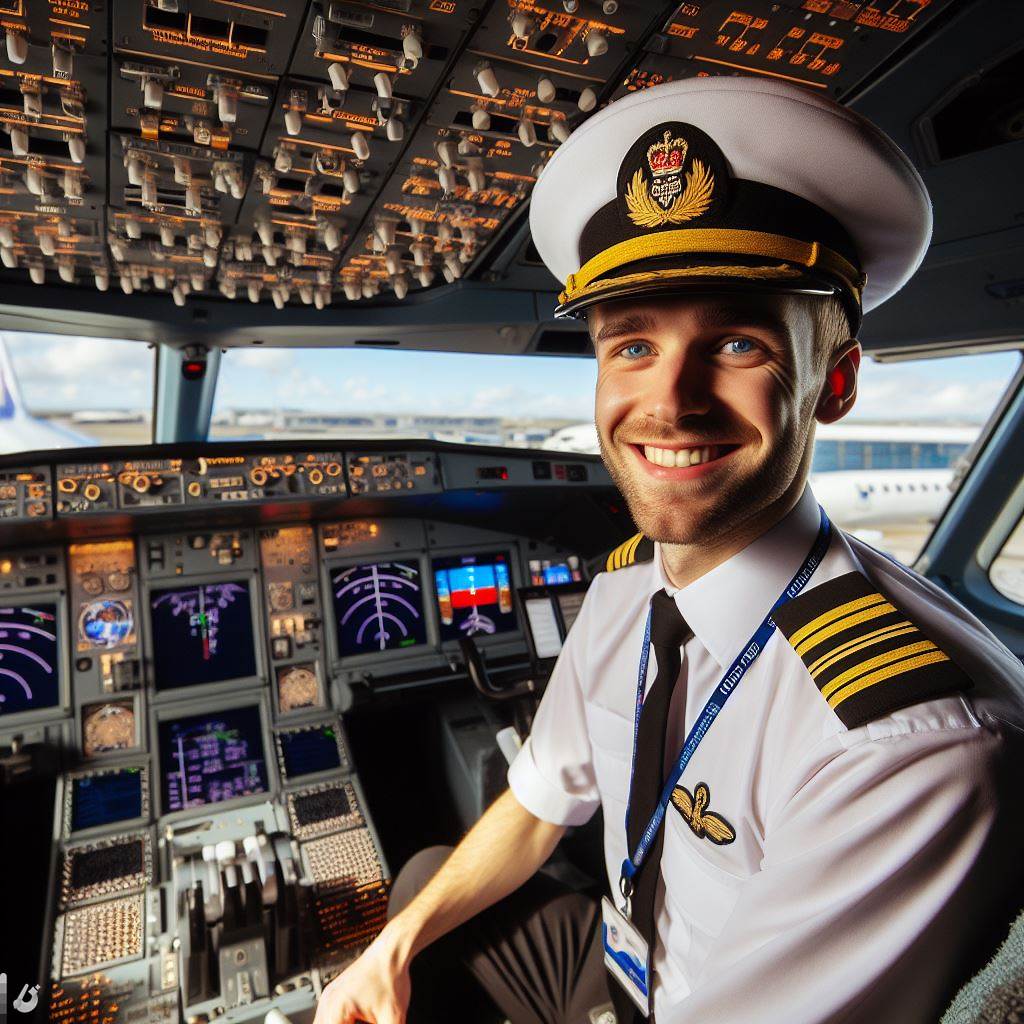Introduction
Pilots in the UK face unique challenges, making stress management crucial for their well-being.
Stress management is important for pilots as it directly affects their performance and safety.
Specific challenges for UK pilots include long working hours, unpredictable schedules, and increased responsibilities.
Against the backdrop of the United Kingdom’s varied and often unpredictable weather patterns, pilots find themselves navigating a tapestry of challenges, from sudden turbulence to rapidly shifting cloud formations.
The very nature of their profession demands a constant state of alertness, adaptability, and the ability to make split-second decisions under pressure.
The cockpit becomes both a command center and a sanctuary, where pilots must not only process complex information but also manage the weight of responsibility that comes with ensuring the safety of countless lives.
In this intricate dance between man and machine, the mental and emotional fortitude of pilots becomes as crucial as the technical prowess required to operate sophisticated aircraft.
The subtle interplay between external factors such as weather conditions, air traffic, and regulatory protocols, coupled with internal factors like fatigue, creates a unique stress cocktail.
This exploration aims to unravel the multifaceted layers of stress management specific to the aviation landscape in the United Kingdom.
From the psychological toll of prolonged flights to the regulatory pressures imposed by a rapidly evolving industry, we will delve into the strategies and tools that empower pilots to not only navigate the skies skillfully but also to cultivate resilience, ensuring they remain at the peak of their performance throughout their demanding careers.
In doing so, we illuminate a path toward a harmonious coexistence of the demanding aviation profession and the imperative of nurturing one’s mental and emotional well-being.
Understanding the Stressors
The common stressors experienced by UK pilots
- Flight time regulations and scheduling: Pilots face strict regulations on their flying hours and scheduling, causing potential stress.
- Pressure to perform well and meet safety standards: Expectations to consistently deliver excellent performance and comply with safety protocols can be stressful for pilots.
- Dealing with unpredictable weather conditions: Pilots must navigate through various weather situations, leading to added stress and pressure to make correct decisions.
The potential impact of these stressors on pilots’ mental and physical well-being
The stressors experienced by UK pilots can have detrimental effects on both their mental and physical well-being.
1. Mental Impact
The pressure to adhere to flight time regulations and scheduling can lead to mental strain and fatigue.
Pilots may have limited rest periods between flights, resulting in sleep deprivation, poor concentration, and impaired decision-making abilities.
The constant pressure to perform well and meet safety standards adds to the mental burden.
Personalized UK Career Consulting
Receive tailored career guidance designed just for you. Get actionable steps and expert support to boost your career in 1-3 days. Take control of your career now.
Get StartedFear of making mistakes or facing negative consequences can increase anxiety levels and compromise pilots’ mental well-being.
Dealing with unpredictable weather conditions creates significant mental stress.
Pilots must constantly evaluate and adapt their flight plans, ensuring the safety of both passengers and crew.
The responsibility for making split-second decisions can be mentally taxing and cause additional anxiety.
2. Physical Impact
The stressors faced by pilots can also have physical repercussions on their well-being.
Flight time regulations and scheduling may result in irregular sleep patterns and disrupted circadian rhythms.
This can contribute to fatigue, insomnia, and overall physical exhaustion, affecting pilots’ alertness and reaction times.
The pressure to perform well and meet safety standards can lead to increased heart rate and blood pressure, causing physiological stress.
This stress response can have long-term effects on the cardiovascular health of pilots.
Coping with unpredictable weather conditions often involves handling intense turbulence or challenging landings.
These physical demands and the need to stay physically fit to carry out their responsibilities can place additional strain on pilots’ bodies.
In short, understanding the stressors that UK pilots face is essential to address their mental and physical well-being.
Flight time regulations, performance pressure, and unpredictable weather conditions all contribute to the stress experienced by pilots.
These stressors can negatively impact their mental health, leading to fatigue, anxiety, and impaired decision-making.
Your Dream Job Starts with a Perfect CV
Get a tailored CV and cover letter that captures your unique strengths and stands out in your industry. Let us help you make an unforgettable first impression.
Get StartedMoreover, physical well-being may suffer due to disrupted sleep patterns, increased heart rate, and the physical demands of their profession.
It is vital for both pilots and the aviation industry to recognize these stressors and implement effective stress management strategies to ensure the overall well-being of pilots in the UK.
Read: Navigating UK Weather: Tips for Pilots
Importance of Stress Management for Pilots
The potential consequences of unmanaged stress for pilots:
1. Decreased concentration and decision-making abilities
Unmanaged stress can impair the ability of pilots to focus and make critical decisions during flights.
2. Increased risk of burnout and mental health issues
Continuous exposure to stress without proper management can lead to burnout and various mental health issues among pilots.
3. Negative impact on personal relationships and work-life balance
Stress can cause strain on personal relationships and make it challenging for pilots to maintain a healthy work-life balance.
The need for pilots to prioritize their mental health and well-being
1. Pilots are responsible for the safety and lives of their passengers
Managing stress is crucial in ensuring that pilots can perform their duties effectively and safely.
2. Stress can affect judgment and decision-making in critical situations
By actively managing stress, pilots can enhance their cognitive abilities and make sound decisions, especially during emergencies.
3. Promoting mental well-being contributes to overall flight safety
Prioritizing mental health allows pilots to be more alert, focused, and capable of handling challenging situations during flights.
4. Stress management enhances job satisfaction and longevity in the aviation industry
By practicing effective stress management techniques, pilots can find greater job satisfaction and reduce the risk of opting for early retirement.
5. Engaging in stress reduction activities improves pilot performance
Engaging in activities such as mindfulness, exercise, and hobbies can help pilots relax, recharge, and perform at their best.
6. Peer support and open communication foster a positive work environment:
Encouraging pilots to support and communicate with their peers about stress-related concerns creates a supportive work environment.
7. Stress management benefits personal well-being outside of the cockpit
Effective stress management techniques can also improve pilots’ personal lives, leading to healthier relationships and a better work-life balance.
Stress management is of paramount importance for pilots, considering the potential consequences that unmanaged stress can have on their performance, mental health, and personal lives.
Optimize Your LinkedIn for Success
Boost your LinkedIn profile with a professional bio, keyword-rich headline, and strategic recommendations that attract recruiters. Stand out from the crowd and get noticed.
Optimize NowPrioritizing mental well-being is not only crucial for flight safety but also enhances job satisfaction, longevity in the aviation industry, and overall well-being.
By promoting stress reduction activities, encouraging open communication, and providing peer support, the aviation industry can help pilots effectively manage stress and maintain a healthy work-life balance.
Read: The Impact of Brexit on UK Pilots

Gain More Insights: Brexit’s Impact on UK Logistic Coordinators
Effective Stress Management Techniques
Overview of Various Stress Management Techniques Suitable for Pilots
- Healthy lifestyle choices: Exercise regularly, eat nutritious meals, and ensure sufficient sleep.
- Effective time management and prioritization strategies.
- Utilize relaxation techniques such as deep breathing, meditation, and yoga.
- Seek professional support through counseling, therapy, or participation in support groups.
- Develop a strong support network among fellow pilots.
Benefits of Each Technique and Incorporation into a Pilot’s Routine
1. Healthy Lifestyle Choices
Maintaining a healthy lifestyle offers numerous benefits for pilots.
Regular exercise helps reduce stress levels, improves physical and mental well-being, and boosts energy levels.
Proper nutrition provides essential nutrients, enhancing brain function and promoting overall health.
Sufficient sleep is crucial for rest and rejuvenation, leading to increased alertness and better performance in-flight.
These lifestyle choices can be incorporated into a pilot’s routine by scheduling regular exercise sessions, planning healthy meals, and adhering to a consistent sleep schedule.
2. Time Management and Prioritization Strategies
Effective time management allows pilots to handle their responsibilities efficiently, reducing stress.
Techniques such as creating to-do lists, setting realistic goals, and prioritizing tasks can help pilots stay organized and focused.
Setting aside dedicated time for important tasks and delegating when necessary can also alleviate stress.
Pilots can incorporate these strategies into their routine by using electronic or physical planners, setting reminders, and regularly reviewing and adjusting priorities.
3. Relaxation Techniques
Incorporating relaxation techniques into a pilot’s routine can significantly reduce stress levels.
Deep breathing exercises help activate the body’s relaxation response, promoting a sense of calmness.
Meditation practices enhance mindfulness and mental clarity, reducing anxiety and improving concentration.
Yoga combines physical movement, deep breathing, and mindfulness, offering overall relaxation and stress relief.
Pilots can allocate a few minutes each day for practicing deep breathing exercises, meditation, or yoga, either during breaks or before and after flights.
4. Seeking Professional Support
Professional support, such as counseling, therapy, or participating in support groups, can provide pilots with valuable tools to manage stress.
These services help pilots address underlying issues, develop coping mechanisms, and enhance overall mental well-being.
Pilots can incorporate professional support into their routine by scheduling regular sessions with a therapist or counselor and actively participating in support groups tailored to their needs.
5. Developing a Strong Support Network
Building connections with fellow pilots can greatly benefit a pilot’s mental health.
Having a support network provides opportunities for sharing experiences, seeking advice, and receiving emotional support from individuals who can relate to the unique challenges pilots face.
Pilots can develop a strong support network by actively engaging with professional aviation organizations, attending industry events, and fostering relationships with colleagues.
Incorporating these stress management techniques into a pilot’s routine can significantly improve their ability to cope with stress and enhance overall well-being.
By making healthy lifestyle choices, effectively managing time, practicing relaxation techniques, seeking professional support, and developing a strong support network, pilots can better manage stress and maintain a positive mindset throughout their demanding careers.
Read: Military vs. Commercial Piloting in the UK
Support Systems and Resources Available to UK Pilots
UK pilots face immense stress and pressure in their day-to-day work.
With the responsibility of ensuring the safety of their passengers and the high demands of their job, it is crucial for pilots to have access to effective support systems and resources that can help them manage their stress levels and maintain their mental well-being.
Thankfully, the aviation industry has recognized the importance of providing such support and has implemented various systems to assist UK pilots.
The Existing Support Systems and Resources Specifically Tailored for UK Pilots
Professional organizations and unions offering support and counseling services
One of the main sources of support for UK pilots comes from professional organizations and unions.
These organizations understand the unique challenges pilots face and offer tailored support and counseling services.
They provide a safe space for pilots to discuss their concerns, seek advice, and share experiences with others who understand their profession.
Having a network of peers who can provide guidance and a listening ear can be invaluable in managing stress and maintaining mental health.
Employee assistance programs provided by aviation companies
In addition to professional organizations, aviation companies also play a significant role in supporting their pilots.
Many companies have employee assistance programs (EAPs) in place to assist their employees, including pilots, with various personal or work-related issues.
EAPs typically offer counseling services, referrals to mental health professionals, and resources to help pilots cope with stress.
These programs aim to address the specific challenges faced by pilots and promote a healthy work-life balance.
Mental health helplines and specialized services for pilots
Furthermore, there are mental health helplines and specialized services specifically designed for pilots.
These services understand the unique psychological demands of the aviation industry and offer support tailored to pilots’ needs.
Pilots can seek confidential advice, counseling, and resources from trained professionals who are familiar with the challenges faced in their line of work.
Having access to such services can help pilots address their mental health concerns early on and prevent them from escalating.
Encouraging Pilots to Utilize These Resources and Seek Help When Needed
Despite the availability of support systems and resources, many pilots hesitate to seek help due to the fear of stigma or concerns about their professional reputation.
However, it is essential to emphasize the importance of prioritizing mental health and seeking support when needed.
Pilots must recognize that seeking help is not a sign of weakness but rather a proactive step toward maintaining their well-being and ensuring the safety of their passengers.
By utilizing the support systems and resources available to them, pilots can better manage stress, improve their mental health, and enhance their overall job performance.
It is crucial for organizations to create a culture that encourages open discussions about mental health and promotes the use of available resources.
This can be achieved through awareness campaigns, training sessions, and regular communication about the support services offered.
By normalizing the act of seeking help, pilots will feel more comfortable reaching out when facing stress or mental health challenges.
In a summary, UK pilots have access to various support systems and resources that are specifically tailored to their needs.
Professional organizations, unions, employee assistance programs, and specialized services play a crucial role in providing the necessary guidance and support.
It is essential for pilots to be aware of these resources and to actively seek help when needed.
By prioritizing their mental health, pilots can better manage stress, enhance their well-being, and ensure the safety of their passengers.
Read: Pilot Unions in the UK: Their Influence
Conclusion
Stress management is crucial for UK pilots to ensure their well-being and job performance.
Stress management isn’t just a task; it’s a transformative journey for UK pilots. Acknowledge the power of mindfulness, exercise, and supportive networks.
Cultivate resilience to face the unpredictable nature of aviation.
Pilots should prioritize their mental health and take steps to manage stress effectively.
Your mental well-being isn’t a luxury; it’s an essential component of your professional toolkit.
As you navigate the skies, remember that a well-managed mind is your most valuable asset.
Embrace stress management not as a burden but as a source of strength.
Your commitment to mental health is not just for you; it ensures safer skies and a thriving aviation community.
It is important to convey a positive and empowering message to pilots, highlighting that stress management is attainable and beneficial for their overall fulfillment and professionalism.
So, pilots, take charge, prioritize your mental health, and let the skies become your canvas for success and personal growth.
[E-Book for Sale]
500 Cutting-Edge Tech Startup Ideas for 2024 & 2025: Innovate, Create, Dominate
$19.99 • 500 Tech Startup Ideas • 62 pages
You will get inspired with 500 innovative tech startup ideas for 2024 and 2025, complete with concise descriptions to help you kickstart your entrepreneurial journey in AI, Blockchain, IoT, Fintech, and AR/VR.




